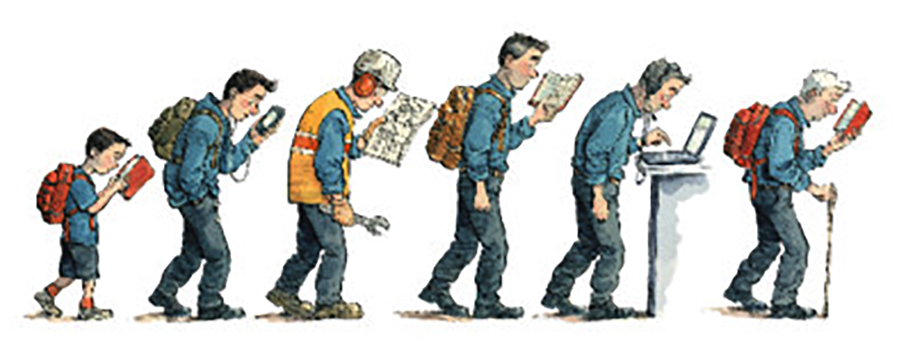First Day of the Rest of Your Life
February 7, 2021

It’s Super Bowl Sunday. Or what I like to call…
Just another Sunday.
I’m not a sports fan. Yes, I used to play. I had good high school careers in football and baseball, I squandered my time in college baseball, but I did enjoy a long softball and baseball career before finally retiring at the age of 54. I walked away while I could still walk away from the game. But that’s just it; they’re games.
So this Sunday morning, like every other weekend morning, I’m working on lesson plans while channel surfing through numerous news stations and scrolling online through various news sites. I’m listening to and reading about the weather (Ugh! More snow!), politics (Uugh! Just in general!) and the pandemic (Uuugh! I want a vaccine!).
I always find the most disturbing stories, however, to be those about companies closing their doors and the resulting loss of jobs. Brick and mortar retail outlets have been devastated. According to Forbes.com, Godiva Chocolates is closing its stores and will sell only online or through outlets. According to BestLifeOnline.com, Sears has gone from 489 stores in 2019 to 36 at the end of last month, and Kmart is down to 30 locations from 360 in that same timeframe.
But what really caught my eye today was the closing of a Nabisco plant in Fair Lawn, NJ, and the 600 people now faced with finding new jobs in a depressed employment market. Yes, there were small gains in new jobs last month, but it wasn’t all good news. “Though we gained jobs in January after a December loss, this is not a we’ve-turned-the-corner report,” said Robert Frick, corporate economist at Navy Federal Credit Union, told CNBC.com. “We especially shouldn’t take solace that the unemployment rate fell dramatically given that’s mainly because more Americans dropped out of the labor force.”
In the larger picture, 600 newly displaced workers does not seem newsworthy. But I thought “why” they lost their jobs was.
According to the Associated Press, the New Jersey plant has operated for 63 years, but was closing, the company said, because it faces, “significant operational challenges, including aging infrastructure and outdated production capabilities, which would have required significant investment to bring them to the modernized state required for the future.”
In other words, the company failed to invest strategically over six decades in the infrastructure and production capabilities to prevent the facility from becoming outdated and useless.
Laurie Guzzinati, Nabisco’s senior director of corporate and government affairs in North America, told the AP the closure notice was “a difficult day for employees,” adding that the decision “is not a reflection of their contributions or their commitment to the business.”
In other words, the company has milked as much production and profit they could out of the employees.
Local 719 President Richard Nazzaro, calling the decision “despicable,” said employees “worked loyally all through the pandemic, every day coming into work risking their health to provide cookies to the American people and profits for their pocket.” He said his members “are devastated. They have no idea what the future holds for them and their families.”
I learned many years ago that companies are not in business to provide jobs to their employees. I understand the need for a company to operate profitably; that’s not my point. I want to emphasize to workers – of every age, at every level, and particularly my high school students just starting out – that you can never take your job for granted. Long gone are the days of working for a company for decades and retiring with a gold watch. Companies ultimately look at employees as, simply, a cost of doing business.
You can avoid being a victim in this inevitable situation by adopting the idea that learning is never-ending. Graduation from high school is not the end-all to your development. You must take responsibility for your own personal growth and constantly work to improve yourself. Designate some of your free time to personal growth. Commit to reading 10 pages of a book every day. Stop playing video games all day or watching so much sports (wink, wink). Focus, instead, on what type of work you’d like to do if you suddenly found yourself out of work. Put down the TV remote, and start reading and studying on your own. There are plenty of online resources, you can order books online, or even take a class –online or at the local community college – to see if you like a particular industry or career (HINT: you should always be thinking about “career” and not just a “job”).
I don’t believe college has to be the ultimate answer. I know too many people who work in the trades – construction, electrical, HVAC, plumbers, culinary, mechanics, etc. – who have maintained successful careers utilizing marketable skills in areas that will never go away or be outsourced. Many became business owners and employed others, helping to boost the economy even further. Unfortunately, I know more people, like those at the Nabisco plant and in retail, who have had their jobs pulled out from under them and they’re left scrambling to find work.
There’s a very good chance that at some point through your career you’ll find yourself forced to make a change. Don’t wait for it to happen. Start today — even if it is Super Bowl Sunday — and be proactive. Start taking steps today to better your life.



